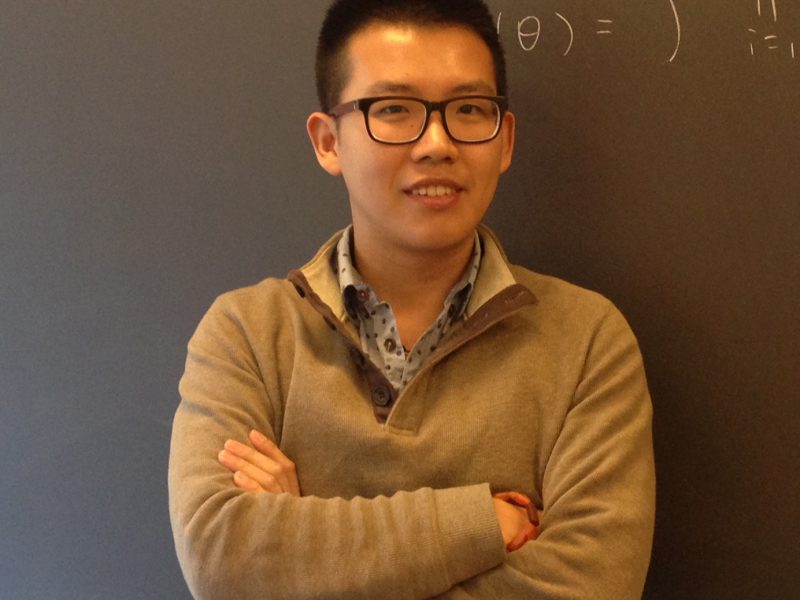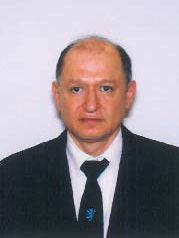
...will describe stochastic variational inference, an approximate inference algorithm for handling massive data sets. Stochastic inference is easily applied to a large class of Bayesian models, including topic models, time-series models, factor models, and Bayesian nonparametric models. Then I will discuss black box variational inference, a generic algorithm for approximating the posterior. We can use black box inference on many models with little model-specific derivation. Together, these algorithms make Bayesian statistics a flexible and practical tool for modern data analysis. This is joint work based on these two papers: M. Hoffman, D. Blei, J. Paisley, and C. Wang. Stochastic variational inference. Journal of Machine Learning Research, 14:1303-1347. http://www.cs.princeton.edu/~blei/papers/HoffmanBleiWangPaisley2013.pdf R. Ranganath, S. Gerrish and D. Blei. Black box variational inference. Artificial Intelligence and Statistics, 2014. http://www.cs.princeton.edu/~blei/papers/RanganathGerrishBlei2014.pdf 3/11/2015 Ju Sun (Columbia) 3/18/2015 3/25/2015 4/01/2015 Prof. Peter F. Halpin (NYU) 4/08/2015 Dr. Alekh Agarwal (Microsoft Research) 4/15/2015 Dr. Lars Buesing (Columbia) 4/22/2015 ...
A B C D E F G H J K L M N O P Q R S T U V W X Y Z Cunningham, John P. Professor, Director for Graduate Studies jpc2181@columbia.edu more info » Close John P. Cunningham Professor, Director for Graduate Studies Office: Room 1007 SSW Email: jpc2181@columbia.edu Faculty Leadership, Full-Time Faculty, Program Directors, Senior Faculty, Statistics Department Website Research Interests: statistical machine learning and its applications, particularly neuroscience Add to address book Permanent link to this profile Young, Gabriel Lecturer in Discipline, Director of Graduate Studies for the M.A. Program in Statistics gjy2107@columbia.edu more info » Close Gabriel Young Lecturer in Discipline, Director of Graduate Studies for the M.A. Program in Statistics Office: Room 614 Watson Hall Phone: 212-853-1395 Email: gjy2107@columbia.edu Faculty Leadership, Lecturer in Discipline, Program Directors, Statistics Department Research interests: Time Series Analysis, Functional Data Analysis, Applications to Finance and Economics. Add...

Professor Victor de la Pena’s paper “From Decoupling and Self-Normalization to Machine Learning” was invited and has been published in the “Notices of the American Society” https://www.ams.org/journals/notices/201910/rnoti-p1641.pdf which is distributed to over 30,000 members and member institutions worldwide....
...Year Entered Ph.D. Program: Fall 2019 https://sites.google.com/view/jiajin-sun/home Add to address book Permanent link to this profile Tian, Ye PhD Student Year Entered PhD: Fall 2019 more info » Close Ye Tian PhD Student Email: yt2661@columbia.edu PhD Students, Statistics Department Year Entered Ph.D. Program: Fall 2019 http://www.columbia.edu/~yt2661/ Add to address book Permanent link to this profile Tilva, Abhishek Kantilal PhD Student Year Entered PhD: Fall 2019 more info » Close Abhishek Kantilal Tilva PhD Student Email: a.tilva@columbia.edu PhD Students, Statistics Department Year Entered Ph.D. Program: Fall 2019 Add to address book Permanent link to this profile Yuan, Gan PhD Student Year Entered PhD: Fall 2019 more info » Close Gan Yuan PhD Student Email: gy2277@columbia.edu PhD Students, Statistics Department Year Entered Ph.D. Program: Fall 2019 Add to address book Permanent link to this profile Bradshaw, Casey PhD Student Year Entered PhD: Fall 2018 more info » Close Casey Bradshaw PhD Student...
...» Close Joseph Suk PhD Student Email: js5338@columbia.edu PhD Students, Statistics Department Year Entered Ph.D. Program: Fall 2018 Add to address book Permanent link to this profile Sun, Jiajin PhD Student Year Entered PhD: Fall 2019 more info » Close Jiajin Sun PhD Student Email: js5552@columbia.edu PhD Students, Statistics Department Year Entered Ph.D. Program: Fall 2019 https://sites.google.com/view/jiajin-sun/home Add to address book Permanent link to this profile Tian, Ye PhD Student Year Entered PhD: Fall 2019 more info » Close Ye Tian PhD Student Email: yt2661@columbia.edu PhD Students, Statistics Department Year Entered Ph.D. Program: Fall 2019 http://www.columbia.edu/~yt2661/ Add to address book Permanent link to this profile Tilva, Abhishek Kantilal PhD Student Year Entered PhD: Fall 2019 more info » Close Abhishek Kantilal Tilva PhD Student Email: a.tilva@columbia.edu PhD Students, Statistics Department Year Entered Ph.D. Program: Fall 2019 Add to address book Permanent link to this profile Twili, Daniel PhD Student, ASGC...

...to apply. For further information about the department and our activities, centers, research areas, and curricular programs, please go to our web page at: http://www.stat.columbia.edu Qualifications: PhD in statistics or related field by the date of appointment Application Instructions: All applications must be submitted through Columbia’s online Academic Search and Recruiting portal (ASR). apply.interfolio.com/115316 The application must include the following: A cover letter that explains your motivation for applying for this position and indicates your choice of mentors from the statistics A curriculum vitae (including a list of publications) A brief research statement that summarizes current research interests, past accomplishments, and future research It should contain a short proposal for the research activities you plan to conduct while at Columbia. The names of 3 references—references will be asked to upload letters of recommendation in Review of applications begins on January 13, 2023, and will continue until the position is filled....
...by the date of appointment. Fellows will be expected to pursue a vigorous research agenda and to participate actively in the intellectual life of the Department. The Department currently consists of 38 faculty members and 55 PhD students. The department has been expanding rapidly and, like the University itself, is an extraordinarily vibrant academic community. We are especially interested in candidates who, through their research, teaching and/or service, will contribute to the diversity and excellence of the academic community. Women and minorities are especially encouraged to apply. For further information about the department and our activities, centers, research areas, and curricular programs, please go to our web page at: http://www.stat.columbia.edu Qualifications: PhD in statistics or related field by the date of appointment Application Instructions: All applications must be submitted through Columbia’s online Academic Search and Recruiting portal (ASR). apply.interfolio.com/115316 The application must include the following: A cover letter that explains...
...I will touch on some of the academic debates surrounding the deconfounder, and demonstrate the deconfounder on real-world data and simulation studies. This is joint work with Yixin Wang. [*] https://www.tandfonline.com/doi/full/10.1080/01621459.2019.1686987 4/27/22 Cindy Rush (Columbia Stats) Title: Characterizing the Type 1-Type 2 Error Trade-off for SLOPE Abstract: Sorted L1 regularization has been incorporated into many methods for solving high-dimensional statistical estimation problems, including the SLOPE estimator in linear regression. In this talk, we study how this relatively new regularization technique improves variable selection by characterizing the optimal SLOPE trade-off between the false discovery proportion (FDP) and true positive proportion (TPP) or, equivalently, between measures of type I and type II error. Additionally, we show that on any problem instance, SLOPE with a certain regularization sequence outperforms the Lasso, in the sense of having a smaller FDP, larger TPP and smaller L2 estimation risk simultaneously. Our proofs are based on a...